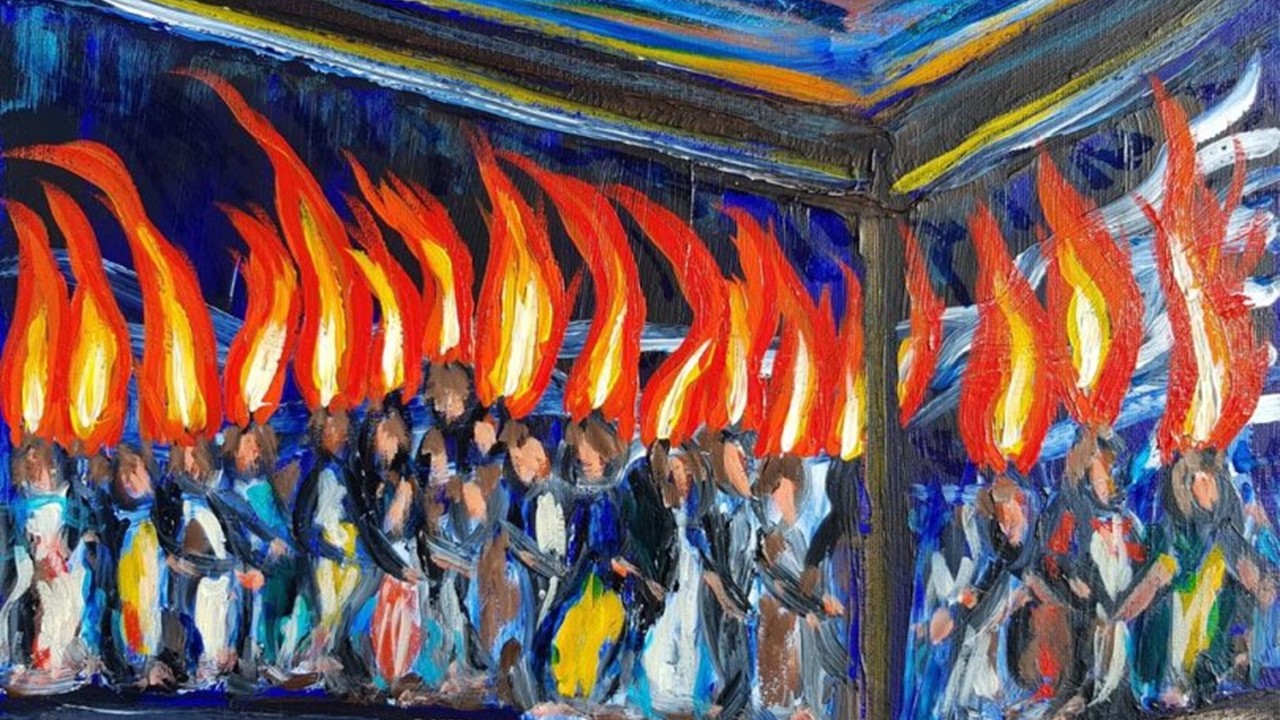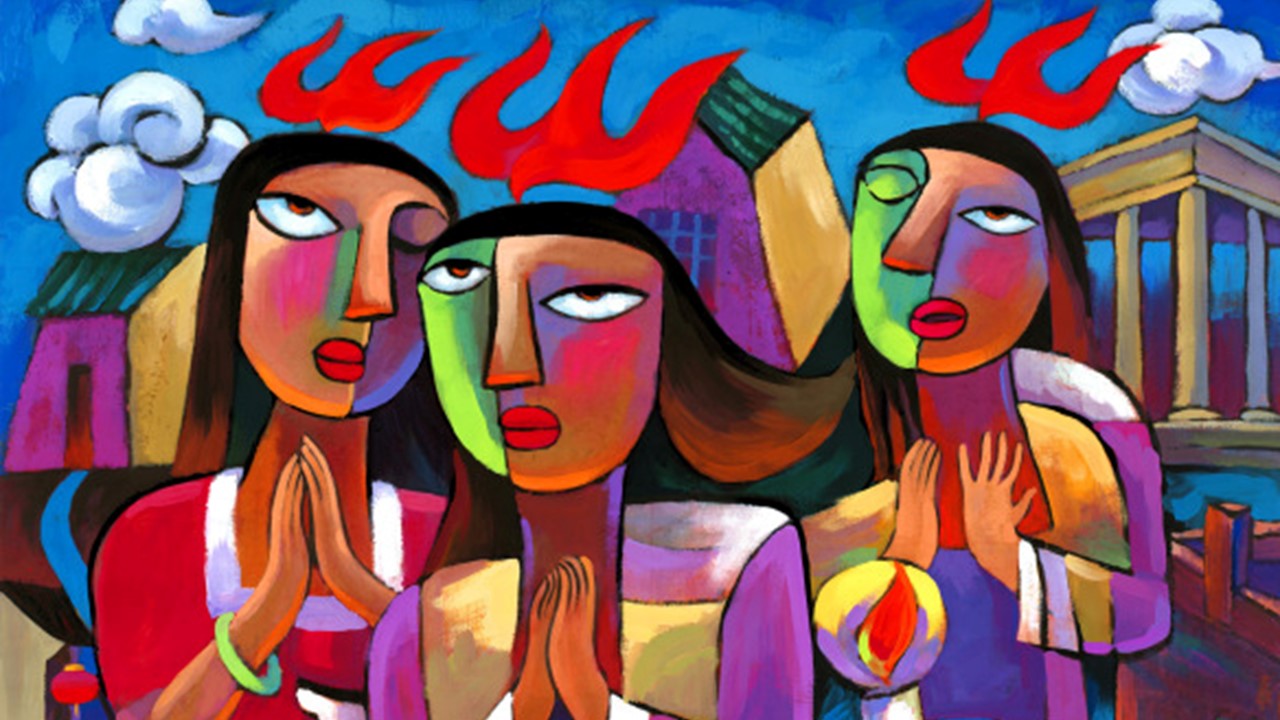Scott AndersonActs 2:1-21 † Psalm 104:24-35b † Romans 8:22-27 † John 15:26-27, 16:4b-15 This was not the first time that fire from heaven came down on the earth. It had happened before. In Exodus[i] we read that fire from heaven descended on the Tent of Meeting. It says, “Moses was not able to enter the tent of meeting because the cloud settled upon it, and the glory of the Lord filled the tabernacle.” Amid the 40 years of wilderness wanderings, whenever it lifted the Israelites would move, but when the cloud of fire settled on it, the Lord was in the tabernacle, and they stayed where they were. The theologian N.T. Wright[ii] reminds us it happened again in 1 Kings[iii]. For generations God lived in the Tent of Meeting, even after David the king had a home of his own. Finally, around 950bce, Solomon, David’s son, had finished the temple. God finally had a permanent home, and on the day of dedication, fire filled the temple in much the same way it had filled the tent of meeting. “The Lord has said that he would dwell in thick darkness,” Solomon proclaims. “I have built you an exalted house, a place for you to dwell forever.” And so God’s presence was assured for the Jewish people, and, in the thinking of this small tribal affiliation known as Israel, Solomon’s Temple became the centering place of the whole world. Not quite 400 years later, when the Babylonians tore down the temple and exiled a large portion of Israel’s population, it presented a profound crisis, as we could imagine. If God lived in the temple, where was God now? Ezra, Nehemiah, and Jeremiah convinced the people the temple had to be rebuilt. And so, in 515—70 years after the 587 destruction—when they returned from exile, they did. They built the second temple, the very same one that stood when Jesus walked. It lasted until the year 70 when this one too was destroyed by the Roman army. There was a problem, though. There is no record that the fire of God, the shekinah or glory of God ever descended on this second temple that stood in Jesus’ day. Wright suggests this embarrassment could explain the growth of the Pharisee movement—a dominant belief in Jesus’ time that if people simply kept to the fundamentals—obeyed the laws more completely, practiced their rituals more perfectly, maintained the sabbath to the letter—then the glory of God would return. Then they would once again be God’s chosen people. But it didn’t. And then Acts 2 tells the story of that day, that last day, that day of Pentecost—that day when the fire from heaven descended not on a building, but on a people. And all people—not just Jews—were baptized and received the Spirit. Do you understand how astonishing, how new this was? Can you imagine how offensive this would have been to those who thought they controlled this religion and its fervor? Do you see the same pressures playing out today? N.T. Wright suggests that the Apostle Paul’s work is defined by the immense implications of this story. Quite simply, Paul, a Pharisee among Pharisees, was floored with the realization that God does not play favorites, but instead that God’s love, God’s power, God’s grace, God’s forgiveness, God’s glory is found in the whole of creation, and in all people—including ultimately, as a result of this boundary-breaking story, you and me. You are the temple of God, Paul tells the church at Ephesus. You are the temple of God, he declares to the Corinthians—a communion, by the way, that was not exempted even though it was a mess—filled with strife and struggle. [iv] And we are the body of Christ in which God’s glory dwells.
Do you believe this? Do you really believe the fullness of this? Do you believe all that it implies? Do you give yourself to the audacious claim of value and possibility this day proclaims? Or do you wonder? Perhaps you consider it true for someone else, but not for you, not for us. In our time apart, we have faced an uncomfortable reckoning when it comes to the racial and economic inequities of our society. We have seen the systematic fortification of white lives and the persistent degradation of Black and brown lives. In our time apart, the violence of white supremacy that we who are white, in our inaction, allow to persist, has become impossible to deny. I know my own inaction. I also know I doubt at times, when it comes to my own sense of self, my own belief in God’s love, my own sense that, as the American Trappist monk Thomas Merton said it, “There is no way of telling people that they are all walking around shining like the sun.”[v] And if I doubt for me, I am sometimes more likely to counteract that by dismissing someone else. But let me repeat that Pentecostal image of fire and light again that Merton first imagined in such a specific place—on a street corner in St. Louis, in a shopping district at the corner of Fourth and Walnut: We are all “walking around shining like the sun.” So if you’re like me, don’t despair. The pastor Rob Bell thinks the disciples became the disciples precisely because it wasn’t what they were expecting to do or be asked to do. They were not the likely candidates. They were not the elite who had been prepared for it from birth. They were tradespeople with modest goals. They were going to take on the family business, get a decent job, nothing more, nothing else. And then Jesus called them. Jesus saw in them what they couldn’t see in themselves. And they left their nets and their lives behind, and they followed. And they started a fire. 17 ‘In the last days it will be, God declares, that I will pour out my Spirit upon all flesh, and your sons and your daughters shall prophesy, and your young men shall see visions, and your old men shall dream dreams. 18 Even upon my slaves, both men and women, in those days I will pour out my Spirit; and they shall prophesy. That’s how Peter explains it to the astonished onlookers. The fire of God has fallen on you and on all people. This is where our story begins. You are the temple of God. You are Christ’s beloved. You are what the world needs. We are Christ’s body. Holy people for holy people. Holy people for a holy world. This is what Gandhi and King understood and what the Poor People’s Campaign today claims. This is what the heart of Judaism understood with its mission to mend the world. And this is what the world needs today. But it cannot begin until we know that we are, we all are the temple of God—Jew and Gentile, Palestine and Israel, American and African, rich and poor, cis and queer—in our brokenness, in our imperfection, in our dreaming and hoping and longing. You are the temple of God for the salvation of a holy world. Thanks be to God. Notes: [i] Exodus 40:34-38. [ii] These ideas are summarized by Richard Rohr in his “Daily Meditation” column. “The Evolution of the Temple” April 20, 2015. Retrieved on May 19, 2018 from http://campaign.r20.constantcontact.com/render?ca=7ff2eee8-2a69-48a2-841e-91640c14c09e&c=ee206a20-643a-11e4-a643-d4ae528eaba9&ch=ee257330-643a-11e4-a643-d4ae528eaba9. [iii] 1 Kings 8:10-13. [iv] Cf. 1 Corinthians 3:16-17, 2 Corinthians 6:16, Ephesians 2:21-22. [v] Thomas Merton. Conjectures of a Guilty Bystander.
0 Comments
Leave a Reply. |
St. Andrew SermonsCategories
All
|


 RSS Feed
RSS Feed